- Home
- Nick Carter
Cambodia Page 2
Cambodia Read online
Page 2
"You're wonderful," she said huskily. "My wonderful, wonderful lover."
My face was lost in the thick richness of her hair. I moved my hand down the small of her back and pulled her closer to me. I could feel the heat of her breath against my neck. The warmth of the sheets deepened, bringing wetness to our mated bodies. It was as though we were welded together.
I could feel her movements begin to hasten. She was climbing again. We started as children, climbing a flight of stairs, at first one step at a time until the distance could be judged. Then the pace quickened. Some of the stairs could be taken two at a time. Hand in hand, we ran up the stairs. I felt growls coming from my throat. We were both very close and noisy. The sheets were a soft-lined oven where we sweltered with effort.
And then we reached the top together. Janet was slightly ahead of me. But when I knew she had made it, I quickly followed. On the other side of the stairs was a long slide. We jumped on it together and slid for long minutes, feeling the rush of wind on our fevered cheeks, arms wrapped tightly around each other.
At the bottom of the slide were piled all the goose-feather pillows of the world. We slid into them together and started tumbling and tumbling. Then all strength left, and we collapsed together.
"Oh, Nick!" Janet whispered hoarsely. "When I die I want to die like that." She felt me moving away from her. "Easy," she said.
I was careful. When I was sitting up with my back propped against the headboard I said, "Want a cigarette?"
"Mmmm."
We smoked in silence for a few moments. My quick breathing returned to normal. This was the fuzzy-soft time. The act of love itself is so basic that all animals can accomplish it. But the feeling, the words before, during and after, were what gave meaning to a relationship.
I looked down at Janet. Her face had a classical kind of beauty. The features were sharp but there was a softness around the mouth. But the gray-green eyes were by far her most outstanding feature.
We had met at a party. I knew she was a fashion model; she knew I worked for some kind of international police force. We knew little else about each other. In our conversations, little things were bound to pop up. I knew she had an illegitimate daughter somewhere; she knew I had been shot several times and had killed at least one man.
We had been going on like this for almost two years.
I had long ago given up trying to figure out how I felt about her. We simply didn't see each other that often. When I was in New York I always phoned her. If she were at home, we got together. Our times together were limited and we both knew it. Either she or I could be snatched away at any time, as I was going to be tomorrow. We'd had almost a week this time.
"I'll be leaving tomorrow," I said.
She blew cigarette smoke straight up to the ceiling. "I think I love you, Nick. You have probably heard that before from many women. But I never thought I could love anybody. And now I think I love you."
"Did you hear what I said?"
She smiled, her eyes twinkling. "I know you're leaving. I knew it when the phone rang. Did you hear what I said?"
I kissed the tip of her nose. "All I can tell you is that I'm always happy when you answer your phone. And I'm sad when we have to leave each other."
"Promise you'll make love to me again before you go?"
"I promise.
* * *
For once the weather in Washington was decent. It was a clear crisp day when I checked in at the offices of the Amalgamated Press and Wire Services. I went directly to Hawk's office.
Hawk was having lunch when I walked in. He had just about demolished a rare steak, and there were only bits left of French fries. Hawk's spare, stringy body was bent over the tray. His leathery face raised toward me and he motioned to a chair opposite his desk. He swallowed the piece of steak he had been chewing.
"You had lunch, Carter?"
I nodded. "Yes, sir, on the plane." Hawk was in shirtsleeves. I pulled off my jacket and hung it on the coat rack. I sat down as Hawk eliminated the last piece of steak. He pushed the tray aside.
Hawk's cold blue eyes studied me. "Sorry to pull you away from — what is her name?"
"Janet," I said, with a smile. "Janet and I have an understanding about these calls."
"Humpf. So how did you leave her?"
My smile widened, "Happy, healthy, hard as a rock and tanned."
Hawk chuckled. He pushed himself away from the desk and stood. At the coat rack he pulled a long brown cigar from his jacket pocket. When the cigar was between his teeth, he suddenly turned his head to look at me.
"Damn it, Nick. I know you get the tough ones. It seems like AXE always gets the dirty assignments. But this one shouldn't be too tough."
I frowned. But I remained silent. I knew Hawk would get to it in his own time. He returned to the desk and sat. When he struck a match to the end of the cigar, the room was filled with a unique aroma. He puffed, then with the stub between his teeth, opened the top drawer of his desk and pulled out a folder.
"What makes this one so different is that we know so little about it." Hawk held the cigar and studied the gray tip. "If we go ahead openly on this, the United States may be in for real trouble." Then he suddenly said, "Nick, how is your Southeast Asian history?"
I blinked at him and shook my head. "About as good as can be expected, I guess. Why?"
Hawk bent over the folder. "Let me read you some facts. Three hundred years ago the land-hungry Vietnamese, descending from the north, wrested the Mekong Delta from its original Cambodian inhabitants. This Delta is a waterlogged world of meandering rivers and crisscrossing canals that, during the summer monsoons, spill over their banks and turn the surrounding countryside into one of the richest rice bowls in all of Southeast Asia."
I said, "Yes, sir, I know. The Delta is about the size of Denmark. I understand that nearly thirty-five per cent of South Vietnam's population is located there."
Hawk nodded. "That's right," he said. "And they work in the mud of a hundred thousand rice fields."
"That's pretty ancient history."
Hawk held up his hand. "Now we get more recent. In the last half of the nineteenth century, the Delta became a French colony, and it was renamed Cochin China. When the French Indochinese Empire collapsed in 1954, the Delta became ripe for Communist picking."
"Well, it might have. But when Ngo Dinh Diem's government was toppled in the late 1960's the United States became involved."
Hawk leaned back. "Involved is a good word, Nick, because we are sure as hell involved."
"Don't tell me the Communists have taken over the Delta."
Hawk gave me a wise smile. The cigar had gone out and he was chewing on it. "Let us say there is a possibility they might try. Somebody — we don't know who — is gathering a group of loyal volunteers to reclaim the Delta for Cambodia. Whether they are Communist or not, we also don't know."
I lit one of my cigarettes. "Is that my assignment? To find out?"
"Partly." Hawk pulled out the cigar and held it between his thumb and index finger. "Nick," he said, "for some time now the United States has been complaining to the Cambodian government that Chicoms are operating and fighting out of Cambodia. Despite the fact that we have aerial photos proving our complaints, Cambodia has denied it all. We felt our hands were tied, that is until yesterday."
I frowned. "Yesterday?"
Hawk nodded. He kept staring at the unlit cigar he was holding. "Yesterday a member of the Cambodian government told an American representative — off the record, of course — that this whole Chicom trouble may be caused by some secret group known as the Society of the Silver Snake. According to the man, the leader of this Society has only one ambition — to reclaim the Mekong Delta for Cambodia. We have no idea who the leader of this Society is, if the Society exists at all."
I said, "It could just be some cover-up for the Cambodian government. Maybe they created it to get off the hook."
"Could be," Hawk said. He stuck the cigar back be
tween his teeth and lit it. I put out my cigarette and looked at Hawk who was puffing again. He said, "Right now the United States is in a ticklish position. This so-called Society is supposedly operating out of some ruined temples in the Angkor Thorn area. The Cambodians seem to think that the leader is using the Society to help the VC. What's more, they have given the United States permission to send in a small strike force to wipe the Society out. But the strike force has to be finished with the job and out of Cambodia within thirty days after landing."
The possibilities of a ticklish situation began to form in my mind. I leaned forward with my elbows on the desk. "You know, sir, it could be a sucker play. Suppose this Society does exist, and suppose it is getting too powerful and the Cambodian government wants it crushed. But when you carry it a little further, suppose Cambodia thinks this Society is planning a coup on the Cambodian government itself. Wouldn't it be dandy to let the United States do the dirty work?"
Hawk placed his palms flat on the desk. "Precisely. And as long as we're supposing, Nick, suppose the Cambodian government wants that strike force inside its borders for propaganda value. I'm sure it could be worked around so the world would think the United States had invaded Cambodia. We would be in one hell of a mess."
Hawk was silent for a moment, chewing on his cigar. I could faintly hear the bustle of other offices outside. In Hawk's office smoke hung from the ceiling, and the room smelled pungent. I gave a small start when Hawk spoke again.
"There is one other possibility, Nick. It's possible this Society does exist and that it is doing just what it says the members are doing-reclaiming the Delta for Cambodia. Maybe they, too, are fighting the Chicoms. They could be used as an ally."
I knew what my job would be before Hawk spelled it out for me. He pushed away from the desk and stood a second, then walked to the window and turned to face me, his hands in his hip pockets.
"So here is your assignment, Nick. You'll go into Cambodia before any strike force or troops are sent in. I want information. Does this Society of the Silver Snake actually exist? If so, where? Is it really trying to reclaim the Delta for Cambodia, or is this a cover-up for other motives? Is this so-called Society connected with the enemy troop movement coming from Cambodia against the United States? Find these things out."
Hawk came back to the desk and closed the folder. When he spoke again, he continued to look at the folder.
"If you are captured, we never heard of you. The United States is not connected in any way. There will be a special strike force of sixteen Marine raiders standing by if you need them. You won't need them unless this so-called Society proves to be our enemy." Hawk gave a long audible sigh.
"A contact has been set up in South Vietnam, as well as a guide, to take you to the ruins at Angkor Thorn. There are things you'll have to pick up at Special Effects. Your plane leaves for Saigon in the morning."
I said, "Anything else, sir?"
Hawk blinked twice. "Good luck, Nick."
* * *
From Special Effects I picked up several things. One was a plastic case containing 12 electronic buttons, 11 were white, one was red. With these I could call the Special Strike Force if I needed them. I listened carefully while the procedure for using the buttons was explained to me.
I also picked up two light plastic suits covered with barbless hooks. The suits looked like light wet suits. While I listened to how they would be used, it was explained to me that the reason I had two was because I couldn't speak Vietnamese. There would have to be someone with me when I used them.
The items were placed in a back pack along with tiny electronic bugging devices and a small radio receiver. A disguise was placed in there, too, an Asian peasant disguise that I would change into once I reached Saigon. Next morning with my pack I boarded the plane for Saigon.
In the raunchy, corrupt city of Saigon I was met by a member of Army Intelligence. I learned my contact in the Vietnamese jungle would be a man named Ben-Quang. I was given the crude map he had drawn. I changed into my disguise, and at midnight boarded the C-47. Then I waited in a village hut for a man named Nam Kien who would guide me to the temple ruins of Angkor Thom.
Three
I awoke with a start. The insects no longer buzzed against the lantern. It was daylight. I sat up slowly, my body stiff from the hardness of the mat. I heard the laughter of children outside the hut. I saw my mashed cigarette of the night before on the earthen floor. Automatically my gaze shot to the table. The pack was still there undisturbed. It was still hot, and I was still sweating.
I concentrated with every fiber in me to relax my muscles and let the stiffness move out of them. I closed my eyes and kept telling myself I was alert and well-rested. I finally opened my eyes, I was completely alert and relaxed. There was no hint of stiffness. I looked to the doorway. Ben-Quang was standing there.
He smiled at me, wrinkling his gnarled face. "You slept well, Mr. Carter?"
I nodded. I rolled to my feet and stood. "It is daylight," I said. "Where is Nam Kien?"
Ben-Quang waved a hand. "He will come, he will come. You Americans, so impatient. So impatient and so comical."
"What do you find so funny?" I asked.
Ben-Quang stuck his arm toward me. "Look at you. You are so large and you try to pass yourself off as a peasant. Only an American would do something so stupid and comical. Come, Mr. Carter, we will eat."
I followed him out of the hut. There were children running between the huts squealing and laughing. They paid no attention to me. In the center of the circle of huts a large black pot bubbled over an open fire. Three old women tended it. Behind each hut was a garden where I could see men working. The air was thick and moist, the sun almost blinding. The village looked like it was inside a small fort. Although there was the brown of the hut roofs and the dirt of the clearing, the green wall of the jungle surrounded everything, green was the dominating color, giving a sense of cool serenity. The insects were hungry. So was I.
As we neared an open fire, Ben-Quang said, "The Red Cross drops rice to us once a week. We try to keep as much as we can."
"Why can't you keep it all?" I asked.
He shrugged. "The Vietcong come through our village. They need rice for their army. They take it."
We reached the fire. The women moved off in a shuffle. They had not taken notice of me. Ben-Quang picked up two wooden bowls, dipped them in the rice pot and handed one to me.
I said, "The children didn't notice me. Neither did the women. Maybe they don't think I'm too large to pass as a peasant."
Ben-Quang led me to the shade of one of the huts. We sat cross-legged with our backs to the wall. He dipped his fingers into his bowl and shoved a loose wad of rice in his mouth. His eyes were closed. I did the same. The rice had all the flavor of watered chalk dust.
"The women and children noticed you," Ben-Quang said.
"They didn't act like it," I said. The second bite tasted a little better somehow.
Ben-Quang said, "They know who you are and why you are here. They take no notice of you because they know you will be gone soon."
"I see. Tell me, do you also find the Red Cross, which drops rice to you once a week, comical?"
His eyes flicked to me then went immediately back to stare at the jungle. "No," he said. "But if the Americans were not here, perhaps we could grow our own rice."
"You'd rather be dominated by Communists?"
He put the rice bowl down and stared at me for a long moment. When he spoke his voice was very soft. "Mr. Carter, my brother has a farm close to Hanoi. He is dominated by Communists. Once a month a man from the government comes to the farm. They sit and talk. They speak of the fields, the weather, what kind of rice year it will be. My brother is treated like a man, a man of pride, an individual. My brother is not a politician. He knows only the man who comes to him once a month. American mortar shells do not bomb his farm. His privacy is not invaded by American GIs looking for the enemy. He has not been pulled from his home and plac
ed in a detestable relocation camp. My brother always has enough to feed his family. And it is food he has grown himself. It is not given to him as though he were a beggar on the streets." He picked up his bowl and continued eating.
"Somehow I get the impression you don't belong in this village," I said.
He chuckled. He shoved the last of the rice into his mouth and put the empty bowl down. "I am chief of this village," he said. "Before the war I taught at the University in Saigon."
I finished my rice. Ben-Quang was again staring into the jungle. I wondered if he could tell me anything about this so-called Society of the Silver Snake. I was about to ask him when he spoke again.
"This village is protected," he said. "There is a company of South Vietnamese regulars being trained by your Light Infantry Brigade. Before they came, we were constantly raided by the Vietcong. So now the Regulars are here with the Americans. When the Vietcong come through our village, they are peaceful. But they are waiting. As long as the Americans are here, the Vietcong will not raid. But they do not believe that, even with tons of M-16 rifles and equipment, the Americans will ever make a fighting unit of the South Vietnamese. So the Vietcong come through our village quietly and at night. They wait in the jungle for the Americans to leave. Then the raids begin again."
I pulled out a cigarette and lit it. Ben-Quang refused the one I offered him. He just kept staring at the jungle. I said, "Ben-Quang, do you know why I'm here?"
"Yes," he said. "You wish to go to the ruins at Angkor Thom."
"That's right. Do you know anything about a group called the Society of the Silver Snake?"
Ben-Quang's eyes dropped. "I have heard rumors of it," he said simply.
I frowned. "What kind of rumors?"
"It is said they get their recruits from surrounding villages. They use terror and murder."
"Do you know how many are in the Society?"

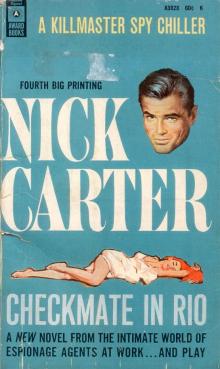 Checkmate in Rio
Checkmate in Rio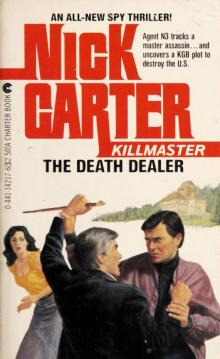 The Death Dealer
The Death Dealer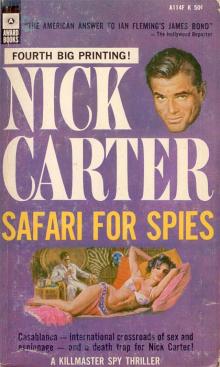 Safari for Spies
Safari for Spies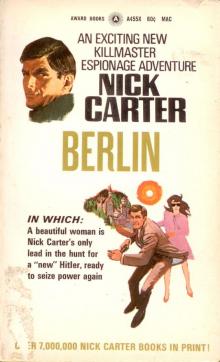 Berlin
Berlin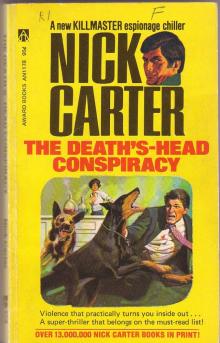 The Death’s Head Conspiracy
The Death’s Head Conspiracy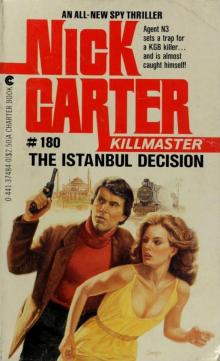 The Istanbul Decision
The Istanbul Decision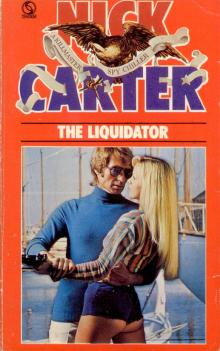 The Liquidator
The Liquidator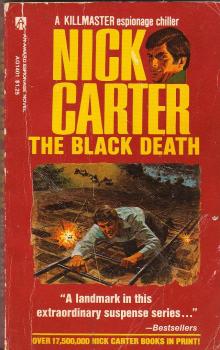 The Black Death
The Black Death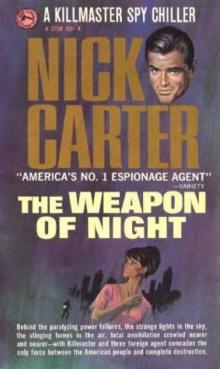 The Weapon of Night
The Weapon of Night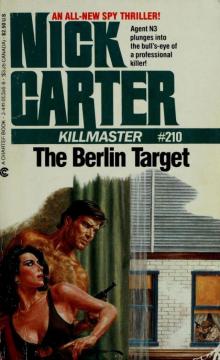 The Berlin Target
The Berlin Target Temple of Fear
Temple of Fear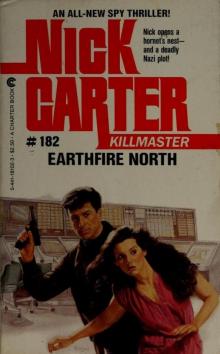 Earthfire North
Earthfire North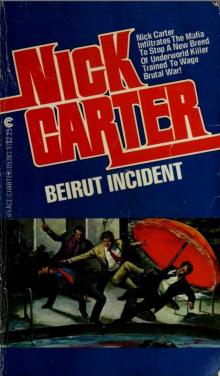 Beirut Incident
Beirut Incident White Death
White Death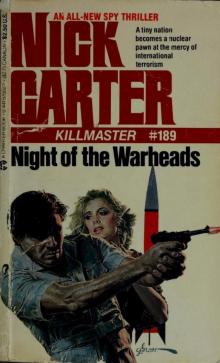 Night of the Warheads
Night of the Warheads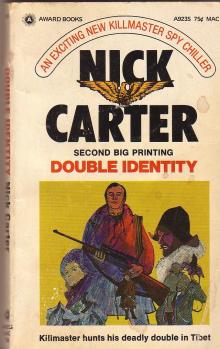 Double Identity
Double Identity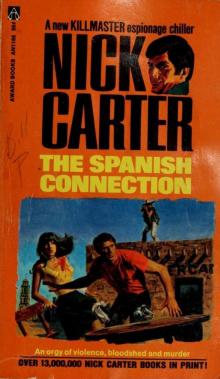 The Spanish Connection
The Spanish Connection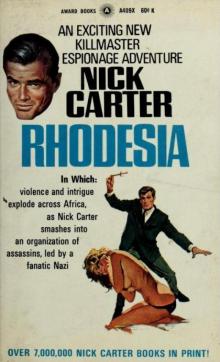 Rhodesia
Rhodesia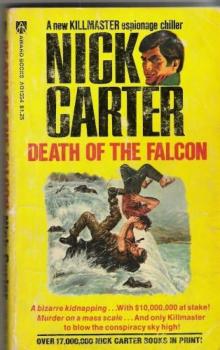 Death of the Falcon
Death of the Falcon The Executioners
The Executioners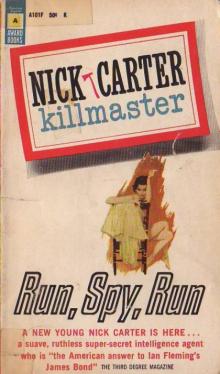 Run, Spy, Run
Run, Spy, Run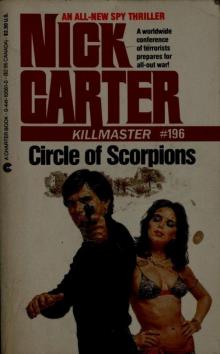 Circle of Scorpions
Circle of Scorpions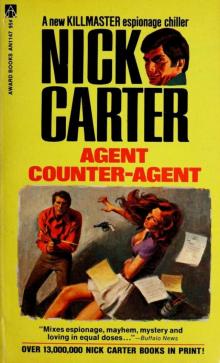 Agent Counter-Agent
Agent Counter-Agent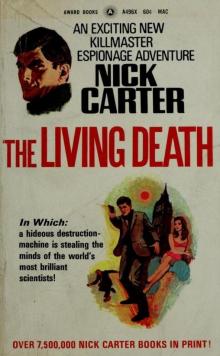 The Living Death
The Living Death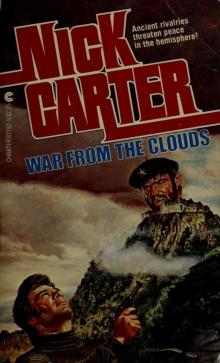 War From The Clouds
War From The Clouds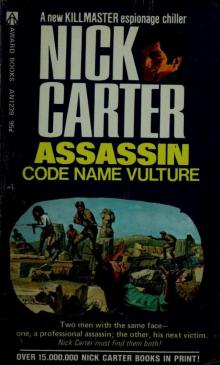 Assassin: Code Name Vulture
Assassin: Code Name Vulture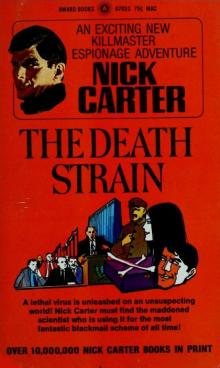 The Death Strain
The Death Strain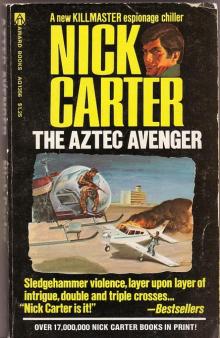 The Aztec Avenger
The Aztec Avenger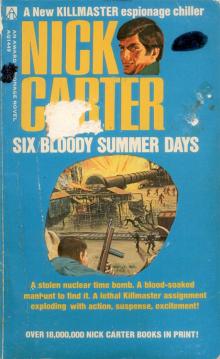 Six Bloody Summer Days
Six Bloody Summer Days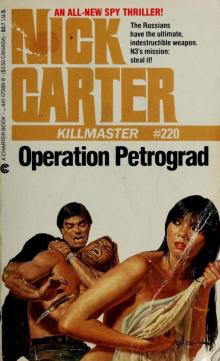 Operation Petrograd
Operation Petrograd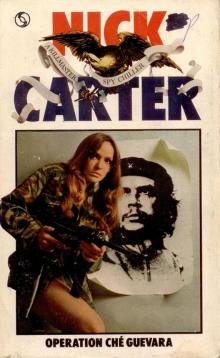 Operation Che Guevara
Operation Che Guevara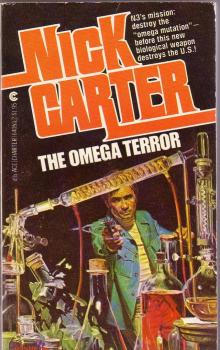 The Omega Terror
The Omega Terror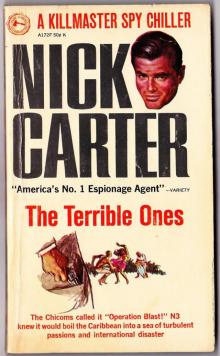 The Terrible Ones
The Terrible Ones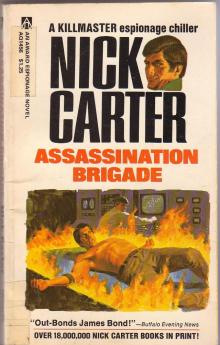 Assassination Brigade
Assassination Brigade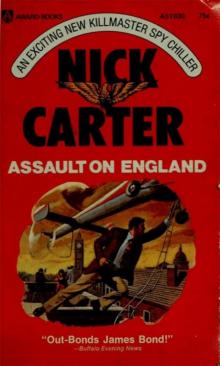 Assault on England
Assault on England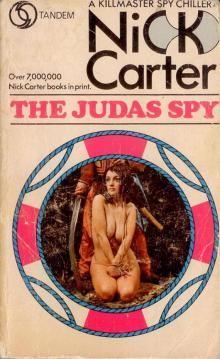 The Judas Spy
The Judas Spy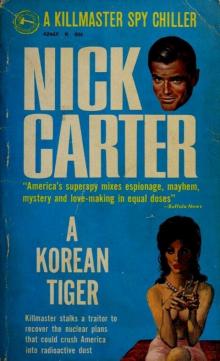 A Korean Tiger
A Korean Tiger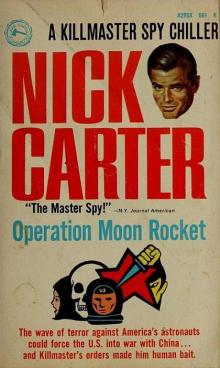 Operation Moon Rocket
Operation Moon Rocket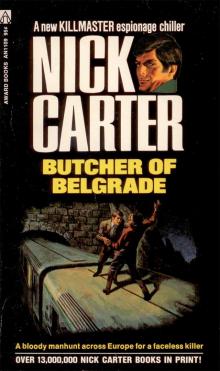 Butcher of Belgrade
Butcher of Belgrade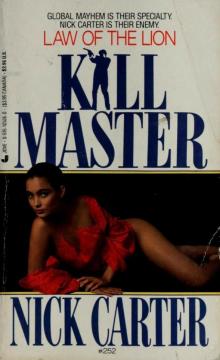 Law of the Lion
Law of the Lion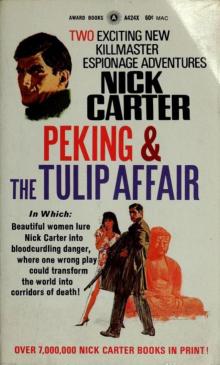 Peking & The Tulip Affair
Peking & The Tulip Affair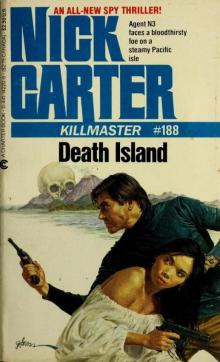 Death Island
Death Island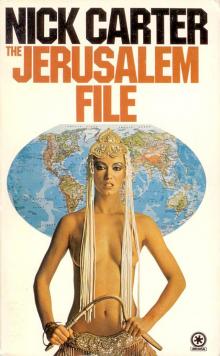 The Jerusalem File
The Jerusalem File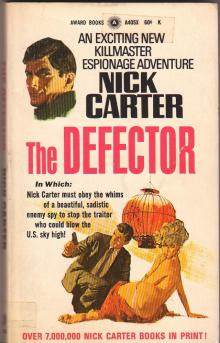 The Defector
The Defector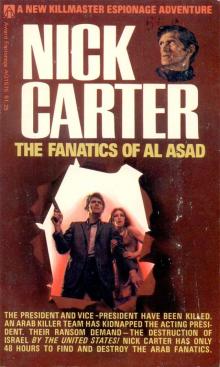 The Fanatics of Al Asad
The Fanatics of Al Asad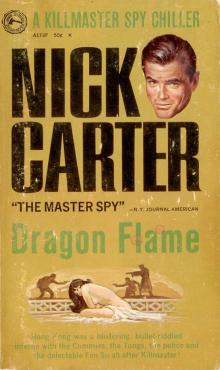 Dragon Flame
Dragon Flame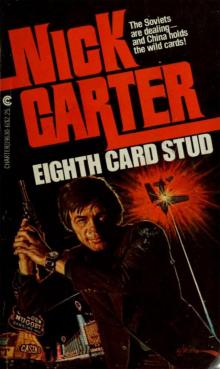 Eighth Card Stud
Eighth Card Stud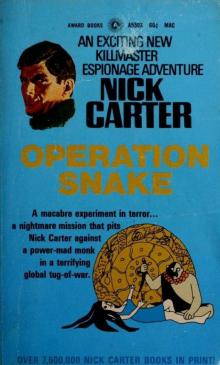 Operation Snake
Operation Snake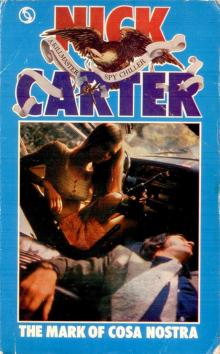 The Mark of Cosa Nostra
The Mark of Cosa Nostra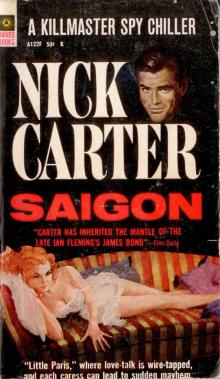 Saigon
Saigon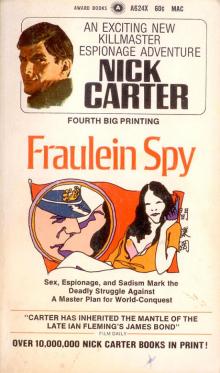 Fraulein Spy
Fraulein Spy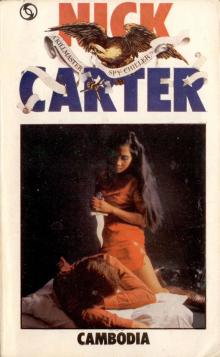 Cambodia
Cambodia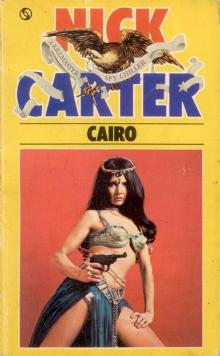 Cairo
Cairo